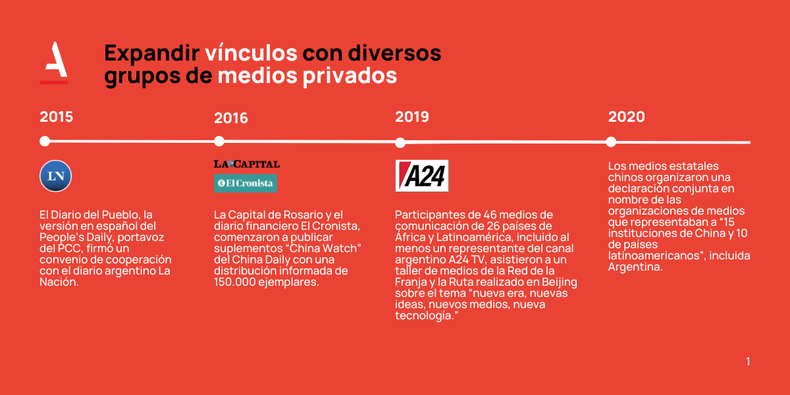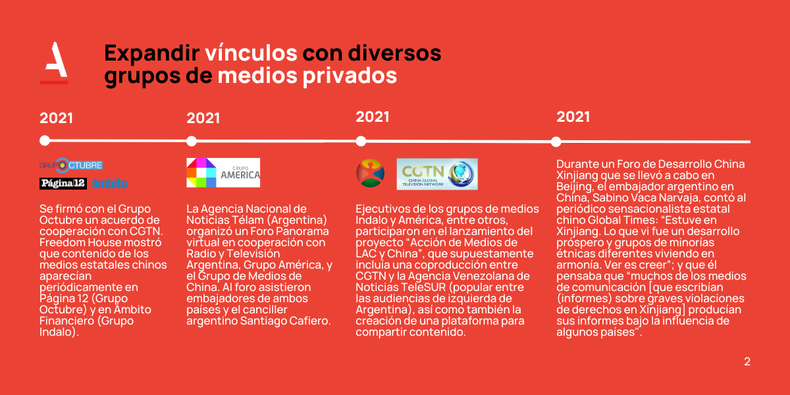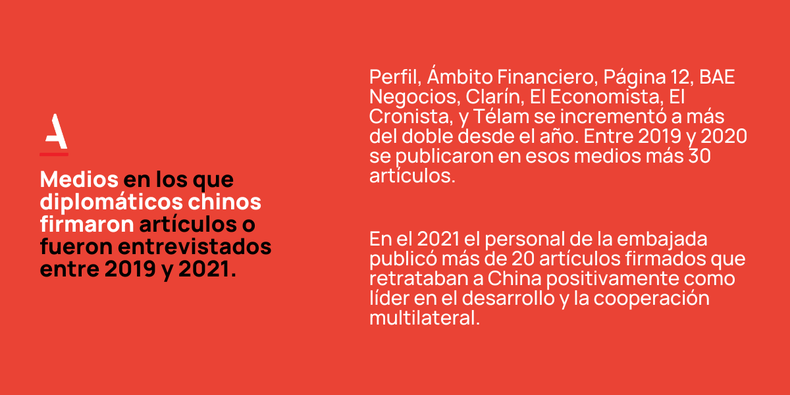Recently, an NGO turned its attention to Argentina to study “the efforts of media influence” by China in the country. This is Freedom House, an American non-governmental organization whose declared mission is to defend democracy, political freedom and human rights in the world. Founded in 1941 and headquartered in Washington, DC, it currently stands out for its investigations, such as the annual report of “Freedom in the World” -which evaluates the state of political rights and civil liberties at a global level- and the production of reports on specific countries and regions on topics such as internet freedom or religious freedom. In general terms, it is financed by both private donations and government grants -including the United States-, private foundations and corporations.
According to this NGO, “Chinese” media influence in Argentina seems to have increased steadily between 2019 and 2021, something that would have manifested itself in “cooperation agreements with Argentine public media” and “new agreements with at least one group of private media ” and increased activity on social networks. However, the NGO assessed that, although Argentines “had a positive image of China” and supported “greater trade”, they did not express “confidence in Xi Jinping’s ability to do the right thing in world affairs” and had “perceptions negative on the record of human rights”.
On the other hand, the “preferred narratives”, says the NGO study, emphasized the “close ties” between the Chinese Communist Party and the ruling Justicialista Party in Argentina, while “fostering stronger bilateral relations”. Diplomats often praised Chinese achievements “in environmental development, economic growth and poverty reduction.” They also expressed solidarity “against foreign interference in internal affairs and supported the claims (…) for the Malvinas Islands.” And Chinese coverage of anti-epidemic cooperation and COVID response “sometimes overlapped with anti-American discourse.”
It should be noted that the Freedom House researchers “found little evidence of the activity of Chinese cyber troops in Argentina, with suspicious accounts amplifying the publications of the Chinese state media,” but they did find that “pro-Beijing editorial lines dominate the content in Chinese” produced and consumed by the local diaspora of approximately 200,000 people. And the Argentine media “frequently reported on local scandals involving Chinese organized crime, as well as environmental issues, labor disputes or corruption cases related to Chinese investments in the country.”
In fact, the NGO report says that even “news outlets that cooperate with Chinese state media do not appear to have shied away from engaging in such critical coverage, and local media also covered civil society efforts to curb the influence of the Chinese state media.” Chinese Communist Party”. However, there are “media vulnerabilities and legal loopholes”, such as “concentrated media ownership as well as a lack of sufficient regulations to ensure transparency and accountability”, which harm “media development independent and sustainable.
In this context, says Freedom House, the “little journalistic experience on China” together with “the constant efforts of the Chinese Communist Party to incorporate influential academic and political voices” can cause “vulnerabilities to the influence of the Chinese media.”However, the real impact of China in Argentina seems to be observed, so far, more in the economic sphere than the media. There, analysts say, the Asian Giant is seen as a prominent trading partner and a possible ally when it comes to protecting itself from external debt commitments, especially those contracted with the International Monetary Fund.
In fact, in the last two decades both countries significantly expanded currency exchange agreements and several Chinese companies have announced investment projects in different strategic sectors of the Argentine economy –such as energy, mining, infrastructure and telecommunications-. In addition, trade between China and Argentina grew suddenly during the pandemic, largely dominated by Argentine exports of soybeans and beef, and China became Argentina’s most important export market. However, this did not eliminate certain points of tension in the bilateral relationship, such as challenges from Chinese organized crime and illegal fishing operations.
Still, Freedom House concludes that “Chinese state media have failed to directly penetrate the Argentine media market despite their best efforts” and instead “rely on partnerships with local media outlets to reach larger audiences.” However, the NGO warns that it may “not take much success to attract a generally receptive audience that lacks knowledge about China.” And he cites a survey carried out in Buenos Aires in November 2021, in which 82% of those surveyed said they had “little or no knowledge about China”, but 55% said they had “a positive image” of the country.
The covert strategy
The Chinese regime led by Xi Jinping does not give up without a thread. The growing interest of the official Chinese media in linking up with Argentine media and opinion leaders is surely part of the plan outlined in Beijing to position the regime and its leader. China is in a process of global expansion that urgently needs an extraordinary diffusion that contributes to building a good reputation of the country abroad. There are many questions that the world has towards China. And, in general, these questions are taken by the populations of the world, even despite the supposed benefits that the presence of China in the economy can bring to their lives.
To mention a few, China’s constant threat to Taiwan is one of the issues that the Western world reproaches China with. Also, suspicions about violations of the human rights of the Uyghur population are increasingly concrete. More recently, his ambiguity about Russia’s invasion of Ukraine did not fare well for Xi either. Western governments, which mistrust the link between Putin and Xi, managed to transfer, for the most part, this feeling of doubt to their population. Lastly, the most forceful thing to tarnish the Chinese reputation was the Covid-19 pandemic. There, without intermediaries, the world population pointed to China as the cause of the virus, voluntary or not. So, if China’s image in the world is affected by these situations, among others, China must do something to counteract a bad image that even economic booms cannot neutralize.
But, if we are talking about economic bonanzas, it is worth saying that in the link between Argentina and China, not all that glitters is gold. Many of the measures taken by the Chinese government regarding the installation of infrastructure in Argentina have a double purpose.The Chinese space base installed in Neuquén is perhaps the most emblematic case. In the Patagonian province there is a base that functions as another Chinese embassy in the country. The workers are Chinese, the labor rules are Chinese, and the handling of information is Chinese, in its entirety. In other words, Argentina barely gives up its territory, in exchange for several million yuan. Another increasingly controversial case is that of the new base that China seeks to install in Tierra del Fuego. The island is a strategic place of passage between the oceans, eventually vital during a world-wide conflict, which could lead to the closure of the Panama Canal, a country much closer to the United States. A third case, although not materialized, has to do with the immense Chinese interest in controlling the Paraná waterway, whose main port is Rosario. The Paraná riverbed is the exit vehicle for a large part of the fluvial trade in Latin America.
All these actions by the Chinese government urgently need strong media support, which helps build the idea of a China that is benefactor of the world, without hidden interests. For China to become the new world leader, at the level of the United States, there must be a positive perception of the Chinese government in the world. Today, that perception does not exist. Quite the contrary. It is not surprising, then, that the Chinese government is increasingly seeking to influence the Argentine media in a concrete way. After all, they are the vehicle to help generate an idea of a good China, respectful of the international order. Without this positive perception, China will never be the world‘s leading country.



